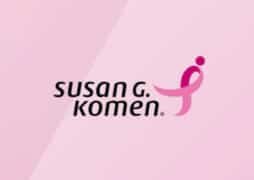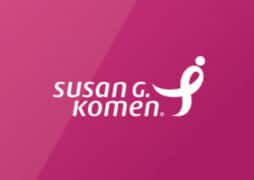More Than 200 Community Members Speak Up at Susan G. Komen® Advocacy Summit
Susan G. Komen®, the world’s leading breast cancer organization, today called on Congress to prioritize three bills that would provide immediate relief to people impacted by breast cancer. There are more than 3.8 million breast cancer survivors or people living with breast cancer in the U.S. Additionally, more than 290,000 women and men in the U.S. will be diagnosed with invasive breast cancer in 2022 alone. Breast cancer is the most common cancer found in women in the U.S. and the second leading cause of cancer death in women.
“A diagnosis of breast cancer often comes with undue hardships on patients and their families,” said Molly Guthrie, Vice President of Policy & Advocacy at Susan G. Komen. “But we believe that policymakers can act now to lessen these undue hardships, by improving access to care, eliminating the financial toxicity of treatments and lowering the cost of tests needed to help diagnose breast cancer.”
Remove a Significant Barrier to Diagnosis: Eliminate Out-of-Pocket Costs for Needed Diagnostic Imaging
The Access to Breast Cancer Diagnostic Act (H.R.5769/S.1067) is currently pending on Capitol Hill and would eliminate out-of-pocket costs for diagnostic breast imaging. When an abnormality is detected in the breast, diagnostic imaging is needed to rule out breast cancer or confirm the need for a biopsy. These diagnostic tests can cost people hundreds to thousands of dollars, out of pocket, making them cost prohibitive.
Cynthia’s Story: Early Diagnosis Made All the Difference for Me
The night before my diagnostic mammogram, the breast center called and asked me for $200, recalls Cynthia Johnson. Cynthia briefly considered cancelling the appointment but decided to put the cost on her credit card, an expense she wouldn’t have been able to bear a year prior.
“I now know that if I had delayed my mammogram my cancer wouldn’t have been caught early. It makes no sense to have free screenings and then stick a huge price tag on further investigation when there is cause for concern. This is a barrier for all, but especially for women of color and women of lower socioeconomic status,” Cynthia says. “Early diagnosis made all the difference for me.”
Prioritize the Needs of Those Living with Metastatic Breast Cancer: Eliminate Ridiculous Waiting Periods for the Care and Financial Support They Require
The Metastatic Breast Cancer Access to Care Act (H.R.3183/S.1312), has bipartisan support in both the U.S. House and Senate but action is needed to move the legislation forward. Passage would allow immediate access to needed benefits for people living with metastatic breast cancer (MBC), the most advanced stage of breast cancer for which there is no cure. Currently, people with MBC must wait five months to receive Social Security Disability Insurance and an additional 24 months to receive Medicare benefits – a huge burden for anyone living with a terminal disease. This is a wait that many will not survive as only 29 percent of people with MBC live five years after their diagnosis, and most of the nearly 44,000 breast cancer deaths this year will be from MBC.
Janet’s Story: Everyone Deserves Access
Janet Ramsey, 62, is advocating for immediate access to Medicare and Social Security benefits because she has been unable to work after her diagnosis at age 60. One of the medications she needs costs $8,500 per month.
“I have no job and no insurance so how do I pay for my life saving medication? If I don’t take the medication, I will die. With my age, the statistics gave me one year to live. I am eligible for Medicare two years after my diagnosis,” Janet says.
Demand Expanded Access to Critical Breast Health Safety-Net Services: Reauthorize the National Breast and Cervical Cancer Early Detection Program
Early detection and effective treatment save lives. The progress made over the last 40 years in saving more lives from breast cancer is partly due to catching breast cancers early, when more treatment options are available, and the prognosis is better. But one must have access to screening to benefit from it.
The National Breast and Cervical Cancer Early Detection Program (NBCCEDP) assists women who are low-income, uninsured and underinsured gain access to breast and cervical cancer screening and diagnostic services. But the program must be reauthorized.
Since its inception in 1991, NBCCEDP has served more than 6 million women, detecting nearly 74,000 invasive breast cancers and over 23,000 premalignant breast lesions. Legislation will soon be introduced that would reauthorize the critical program for another five years and provide greater flexibility to implement innovative evidence-based interventions and aggressive outreach to underserved communities through media, peer educators and patient navigators.
Caitlin’s Story: We’ve Lost Too Many to Breast Cancer
Caitlin Uriarte is an aspiring public health professional and motivated volunteer who is passionate about ending breast cancer. She spends time educating others on the importance of screening and promoting healthy behaviors through programming.
“I know too many individuals who lost someone from breast cancer,” Caitlin says. “I want to help combat breast cancer with increasing access to care to those who really need it.”
Komen’s Guthrie added, “Common sense policy changes could go a long way toward helping detect breast cancer and helping minimize the financial suffering for those it has impacted. Congress must prioritize and pass them without further delay.”
Anyone interested in joining Komen’s efforts can contact their members of Congress today.


